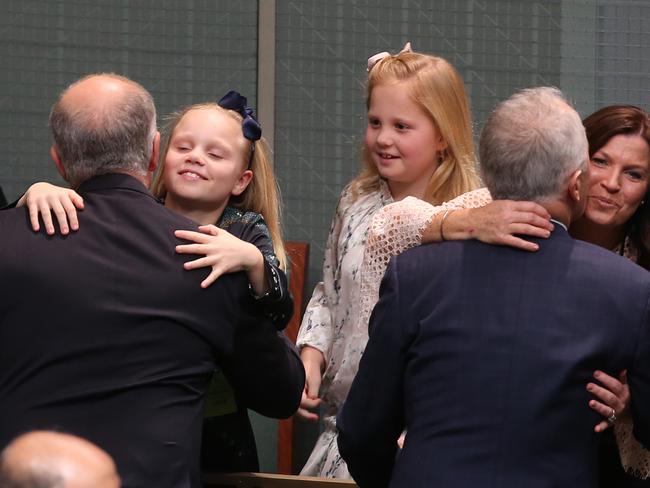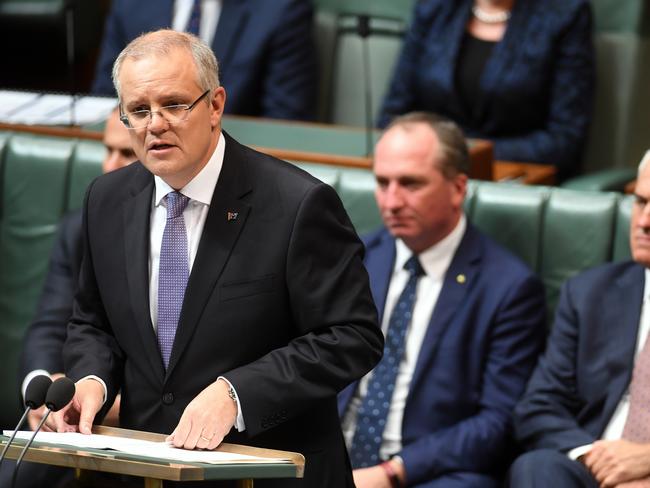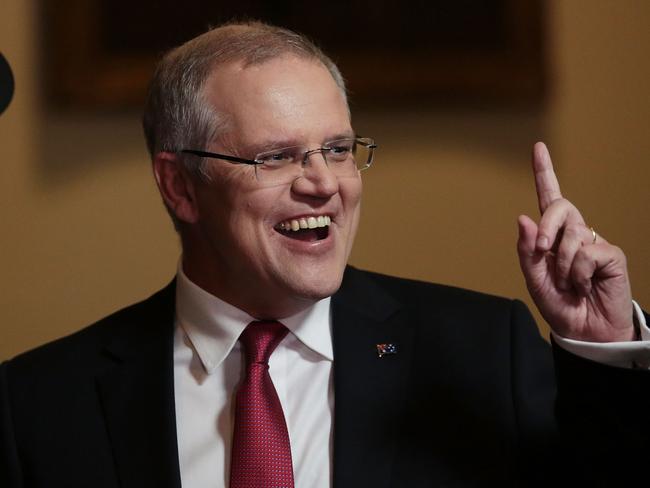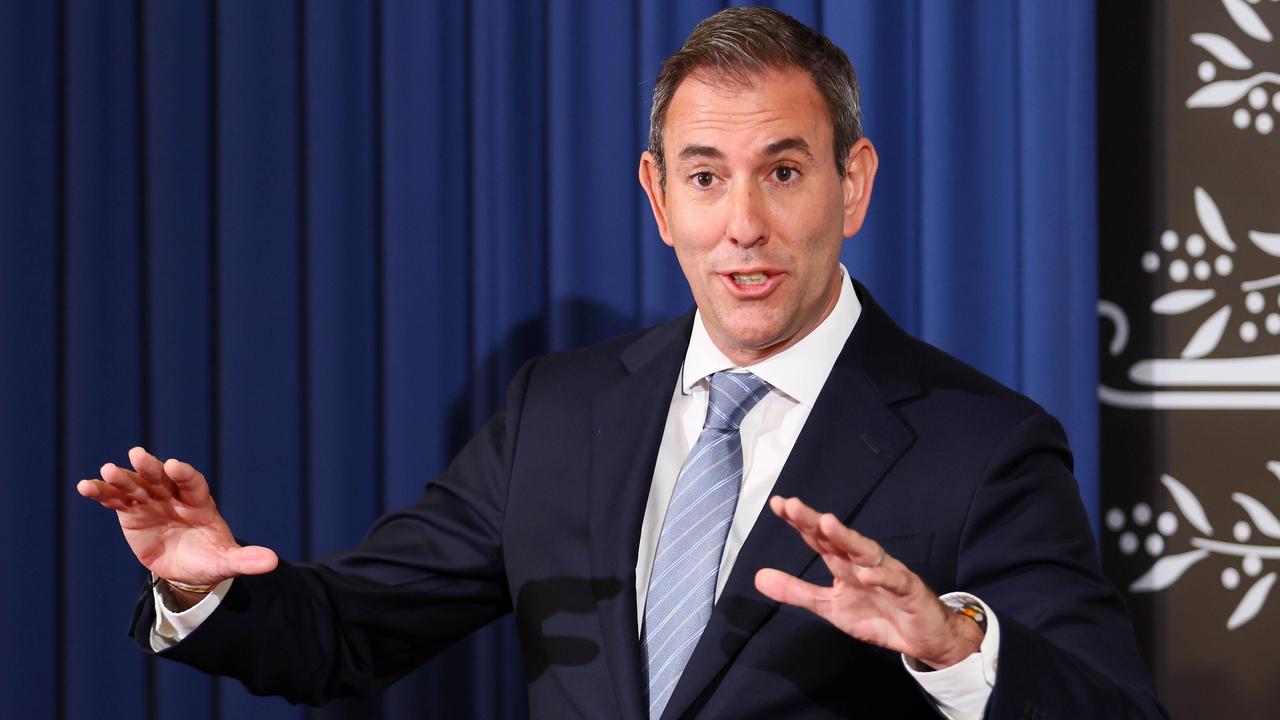Budget 2017: Scott Morrison resets Government’s agenda
SCOTT Morrison has used the Federal Budget to reset the Government’s agenda by guaranteeing Medicare, fully-funding the national disability scheme and introducing tough new measures to crackdown on welfare cheats — including drug tests.
Federal Budget
Don't miss out on the headlines from Federal Budget. Followed categories will be added to My News.
TREASURER Scott Morrison has used the Federal Budget to reset the Government’s agenda by guaranteeing Medicare, fully-funding the national disability scheme and introducing tough new measures to crackdown on welfare cheats — including drug tests.
Promising “better days” ahead, Mr Morrison has taken the pressure off families to shoulder the burden of returning the Budget back to balance by taxing banks, multinational corporations and foreign property investors.
And in a rejection of the unpopular Abbott era cuts, the Turnbull government will turn its back on a host of languishing unlegislated Budget measures from 2014.
But thanks to strong global growth it is still predicting a healthy $7.4 billion surplus by the end of the decade.
The Government has pledged to fund the National Disability Insurance Scheme in full, through a 0.5 per cent increase to the Medicare Levy.
This equates to $400 a year on an $80,000 salary, or a dollar a day from July 1 in 2019.
Driving a push to get welfare recipients into the workforce, Mr Morrison has announced random drug testing in high-welfare suburbs.
If drug users don’t show they are embarking on a detox plan, they will be stripped of their welfare payments.

The Treasurer declared, in his second budget speech, that Australia’s tough times are over, pencilling in a surplus of $7.4 billion by 2020-21, a halving of net debt to GDP by 2027 and showing restraint by limiting real spending growth to 2.3 per cent a year.
While the net debt is at historic high of $354 billion this year, the deficit next financial year will be $29.4 billion — about $10 billion less than this year.
It is the first marked improvement in the budget outlook since the Global Financial Crisis, largely because of resource prices like iron ore improving.
Mr Morrison’s promised relief for first-home-buyers and pensioners struggling with electricity bills, while pouring billions of dollars into rail infrastructure, including in western Sydney, and funding for the Badgerys Creek airport.
Mr Morrison admitted his Budget was “pragmatic”, “practical” and reflected what could realistically be passed with the current Senate make-up of crossbenchers Nick Xenophon, Pauline Hanson, Derryn Hinch, Jackie Lambie and the Greens.
“The signs of an improving global economy are there to see. This Budget is about making the right choices to secure the better days ahead,” Mr Morrison said.
“Our choices are based on the principles of fairness, security and opportunity.”
The borrowings of the big four banks and Macquarie will be taxed about $200 million each a year, delivering the Government $6.2 billion over four years.
In a tough warning to the banks, Mr Morrison said he would be disappointed if they tried to pass the levy onto homeowners through higher interest rates, urging people to switch to the smaller banks and credit unions if CBA, NAB, Westpac, ANZ or Macquarie pulled this move.
Setting up for a fight with the banking sector, the Government will also hold bank executives to account with fines up to $200 million for misconduct on their watch.
In highly-anticipated measures to help young Australians buy their own homes, Mr Morrison announced first-home buyers will have a tax cut on their first-home deposit savings, by allowing them to salary sacrifice into their superannuation account to the tune of $30,000 each — or $60,000 for a couple.
The Turnbull Government will work with the state government to help deliver tens of thousands of new homes in western Sydney, and set up long-term, low-cost finance to support more rental housing.
To null the pull of Ms Hanson in regional areas, the Government has set up a $472 million Regional Growth Fund to help create jobs and infrastructure in the bush and has announced plans to tax foreigners who want to buy-up real estate in Australia, after they’ve faced accusations of pushing prices up.

Foreign buyers who leave their homes empty will be taxed $5000 a year, while foreigners will no longer have access to the capital gains tax exemption.
Recognising their pitch to Aussies had been wrong, Mr Morrison said Australians had been “frustrated at not getting ahead”.
“This is especially true in areas where technological change, globalisation and the end of the mining investment boom has had a significant impact,” he said.
Arriving at a $7.4 billion surplus has not come from a path of unpopular spending cuts, but a direct result of the lift in commodity prices and a resurgence in the economies of China, United States and our key trading partners in Asia.

“Household consumption, non-mining business investment and exports are expected to support growth,” he said.
But, unlike former Treasurers, Mr Morrison has relied on conservative forecasts for the price of iron ore and coal, which are Australia’s two biggest exports.
The Treasury has ignored the growth boost promised by Donald Trump’s company tax cut proposal, forecasting modest growth in the biggest economy in the world of 2.25 per cent.
There are spending cuts of $9.8 billion of the next four years, mostly from the university sector, a crackdown on welfare bludgers, introducing more generic medicines and ditching the increase to the Family Tax Benefit Part A, affecting about 100,000 families.
While Mr Morrison has sent a clear message that the tough times are over, it won’t feel that way just yet, with the gap between cost of living increases and the growth of wages very tight, at 2 per cent and 2.5 per cent respectively.
Wages are forecast to grow by 3 per cent in 2018 — one percentage point faster than the cost of living, measured by the Consumer Price Index.
Unemployment rate will be stable at 5.75 per cent but is expected to fall slightly to 5.5 per cent in 2018-19.
The Budget also factors in the biggest increase in tax revenue as a share of GDP in 20 years, rising from 23.8 per cent this year to 25.4 per cent in 2020-21.
Company tax is projected to rise from $67.8 billion this year to $95 billion in four years, factoring in the Turnbull Government’s full enterprise tax plan that has not yet passed the Parliament.
Since the GFC, 75 per cent of the growth in our debt has been raised to pay for welfare, health and education.
But Mr Morrison said these should be funded by taxes and revenues — not by debt.
Originally published as Budget 2017: Scott Morrison resets Government’s agenda



